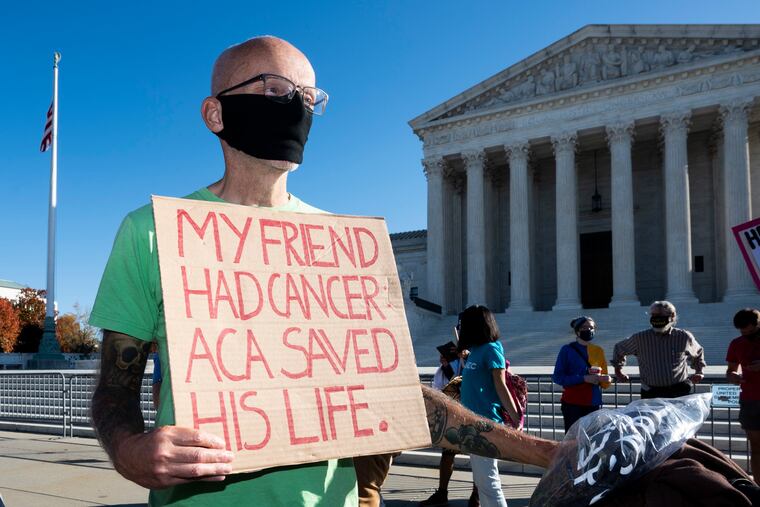Supreme Court ruling upholding Obamacare makes health-care business more predictable
Because the legal challenge was rejected based on lack of standing, the ruling was not a complete victory for ACA supporters.

Opponents of Obamacare must have thought the third time would be the charm. The Supreme Court struck down two previous challenges, but the law’s foes came back again. Their luck was no better this time.
For businesses throughout the health-care industry, Thursday’s ruling makes the future more predictable by ensuring that key provisions will remain in force.
The ACA expanded the availability of health coverage in several ways. It created online exchanges through which individuals who cannot get coverage elsewhere can buy policies regardless of health status with generous subsidies if their income is low. It offered financial incentives to states that expand their Medicaid programs to cover more people. And it allowed children to stay on their parents’ health insurance until age 26.
» READ MORE: Stimulus bill boosts health coverage by expanding Obamacare tax credits and subsidizing COBRA
About 31 million Americans have gained coverage as a result.
To most observers, the outcome before this Supreme Court was not surprising. Several of the justices were skeptical of the challenge during oral arguments on the case in November. The ruling was also decisive, with seven of the nine justices voting to dismiss the case.
The challengers’ argument was a stretch from the start. A group of 18 states led by Texas claimed that the ACA’s mandate to buy insurance became unconstitutional when the tax penalty for violating the mandate was reduced to zero in the 2017 tax reform law.
The court had ruled in 2012 that the mandate was constitutional because it functions as a tax. The challengers contended that while the mandate was no longer a tax, it still harmed their states as well as two individuals who joined them as plaintiffs. They asked the court to strike down the entire law, arguing that the mandate is inextricably intertwined with the rest of it. The court rejected the notion that imposition of a mandate with no penalty constituted sufficient harm to give the challengers standing to sue.
Because the challenge was rejected based on lack of standing, the ruling was not a complete victory for ACA supporters. The court rendered no judgment on underlying issues in the case involving the law’s constitutionality.
The two dissenting justices, Neil Gorsuch and Samuel Alito, argued that there was sufficient harm for the plaintiffs to have standing and that they would have upheld the challenge and thrown out the entire ACA. However, even Clarence Thomas, who had voted against the ACA in the previous cases, declined to join them.
Despite the narrow ground for the ruling, the chances that ACA opponents will have the chance for another reprise before the court seem remote. There had been speculation that the court, with its recently fortified conservative majority, would offer a sympathetic ear to ACA challenges, even tenuous ones. The 7-2 ruling dispelled that notion. It was the most lopsided Supreme Court vote against any of the challenges, with two of the three Trump appointees — Justices Brett Kavanaugh and Amy Coney Barrett — joining the majority.
It is also unlikely that ACA opponents will find a new angle for a future legal challenge. After three trips to the Supreme Court and several other challenges that were dismissed by lower courts, they will have difficulty finding another constitutional objection that can gain legal traction.
It is now more certain than ever that the ACA is here to stay. That means more stability for business planning for health care industry sectors that had adapted to its wide-ranging provisions.
For some sectors, the ruling means that new lines of business can continue. These include insurance companies that sell individual policies on the ACA’s insurance exchanges. They must continue to offer policies to all applicants regardless of health status, but they can expect most of their customers to continue to receive generous subsidies for purchasing them.
Insurance companies that administer state Medicaid programs will retain the burst of new business they gained in the 38 states, including Pennsylvania and New Jersey, that have accepted the ACA’s Medicaid expansion.
The sectors also include hospitals that operate partnerships with other providers, known as accountable care organizations, to coordinate care more effectively for patients with complex conditions. These arrangements will continue to receive financial incentives that the ACA provides through Medicare.
For many health-care companies, it will also mean the need for continued compliance with regulations that affect the way health care is provided and paid for. These include requirements that insurance policies include various protections for consumers, that hospitals take steps to avoid certain medical errors, and that larger employers offer coverage to their workers. These regulations have now been in place for several years, and most affected businesses have adjusted their operations in the expectation that they will continue.
ACA opponents will undoubtedly continue efforts to persuade Congress to alter or repeal the law should Republicans gain control of one or both houses. However, by the time they have their chance, the ACA will have become even more entrenched.
At the same time, the third Supreme Court loss for ACA challengers may embolden the law’s supporters in Congress to try to bolster it by extending more generous subsidies that were included in the stimulus bill passed earlier this year.
Regardless of how the politics play out, it is clear is that the ACA’s legal status is now far more certain.
Robert I. Field holds a joint appointment as professor of law and professor of health management and policy at Drexel University. He is a member of The Inquirer’s Health Advisory Panel and a frequent contributor on health policy topics.